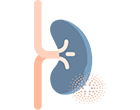Nephrotic Syndrome Precision Panel
Nephrotic Syndrome (NS) is defined as the presence of nephrotic-range proteinuria with a low serum albumin level, edema and hypercholesterolemia, indicating damage to the glomerular filtration barrier.


Nephrotic Syndrome (NS) is defined as the presence of nephrotic-range proteinuria with a low serum albumin level, edema and hypercholesterolemia, indicating damage to the glomerular filtration barrier. Nephrotic-range proteinuria is known as the loss of 3.5 grams or more per day of protein in the urine. Nephrotic syndrome has a plethora of causes in which we can find primary kidney diseases such as minimal change disease, focal segmental glomerulosclerosis and membranous glomerulonephritis, among others. It can also be the result of systemic diseases that involve other organs apart from the kidney such as diabetes, lupus erythematosus and amyloidosis. Genetic causes of nephrotic syndrome consist of defects in glomerular filtration involving a variety of gene mutations, inherited in its majority in an autosomal recessive pattern.
The Igenomix Nephrotic Syndrome Precision Panel can be used to make a directed and accurate differential diagnosis of proteinuria ultimately leading to a better management and prognosis of the disease. It provides a comprehensive analysis of the genes involved in this disease using next-generation sequencing (NGS) to fully understand the spectrum of relevant genes involved.
The clinical utility of this panel is:
Shin, J. I., Kronbichler, A., Oh, J., & Meijers, B. (2018). Nephrotic Syndrome: Genetics, Mechanism, and Therapies. BioMed research international, 2018, 6215946. https://doi.org/10.1155/2018/6215946
Rood, I., Deegens, J., Lugtenberg, D., Bongers, E., & Wetzels, J. (2019). Nephrotic Syndrome With Mutations in NPHS2: The Role of R229Q and Implications for Genetic Counseling. American Journal Of Kidney Diseases, 73(3), 400-403. doi: 10.1053/j.ajkd.2018.06.034
Sharief, S. N., Hefni, N. A., Alzahrani, W. A., Nazer, I. I., Bayazeed, M. A., Alhasan, K. A., Safdar, O. Y., El-Desoky, S. M., & Kari, J. A. (2019). Genetics of congenital and infantile nephrotic syndrome. World journal of pediatrics : WJP, 15(2), 198–203. https://doi.org/10.1007/s12519-018-00224-0
Watanabe, A., Feltran, L. S., & Sampson, M. G. (2019). Genetics of Nephrotic Syndrome Presenting in Childhood: Core Curriculum 2019. American journal of kidney diseases : the official journal of the National Kidney Foundation, 74(4), 549–557. https://doi.org/10.1053/j.ajkd.2019.01.033
Eddy, A. A., & Symons, J. M. (2003). Nephrotic syndrome in childhood. Lancet (London, England), 362(9384), 629–639. https://doi.org/10.1016/S0140-6736(03)14184-0
Braun, D. A., Rao, J., Mollet, G., Schapiro, D., Daugeron, M. C., Tan, W., Gribouval, O., Boyer, O., Revy, P., Jobst-Schwan, T., Schmidt, J. M., Lawson, J. A., Schanze, D., Ashraf, S., Ullmann, J., Hoogstraten, C. A., Boddaert, N., Collinet, B., Martin, G., Liger, D., … Hildebrandt, F. (2017). Mutations in KEOPS-complex genes cause nephrotic syndrome with primary microcephaly. Nature genetics, 49(10), 1529–1538. https://doi.org/10.1038/ng.3933